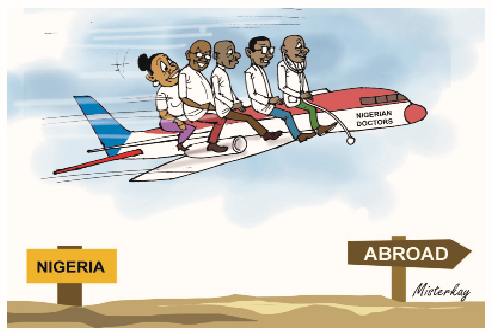The state of healthcare delivery in Nigeria stands at a critical juncture. The prognosis is bleak.
There is daily, an overwhelming number of patients flocking to underfunded and under manned public hospitals; at the same time, the country’s best medical professionals are fleeing abroad to seek better paying opportunities.
There are very few able hands left within the shores of our country to cater for about 218million Nigerians. Put succinctly, the healthcare crisis in Nigeria has reached alarming and epidemic proportions.
At the top public hospitals at Abuja, it is now normal for patients to queue for up to 8 hours before they can be attended to. Even emergency cases either queue for hours on end or leave for private hospitals. Incidentally, though private hospitals may be better equipped their charges are morbidly exorbitant. For instance, some charge as much as N15m for a week of chemotherapy. It is that expensive!
With about 218million people to cater for, Nigeria requires at least 363,000 additional doctors. This is according to the president of Nigerian Medical Association (NMA) Dr Uche Rowland. Currently, Nigeria has only 24,000 medical doctors while the current doctor-patient ratio is 1: 9,083, meaning one doctor per 9,083 Nigerians. That is to say, there is one doctor to attend to 9083 patients!
Overcrowded Public Hospitals
One of the most visible symptoms of the healthcare crisis in Nigeria is the acute and permanent overcrowding of public hospitals. Due to the poor ratio of patients to doctors, wait times are high and compromised patient care has become the norm. Surely, overworked and overwhelmed healthcare professionals are unable to provide meticulous quality care that patients need and deserve.
Any Nigerian who has had cause to go to public hospitals in recent times, be it in the nation’s capital Abuja, or Lagos the nation’s commercial capital, or Kano the commercial nerve centre of Northern Nigeria or Port Harcourt, the Rivers State capital and a major hub of oil and gas in Nigeria or Onitsha the biggest commercial centre in South East, would agree that the public health system has collapsed completely. The hospitals cannot even ne called ‘mere consulting clinics’ because there are no doctors to consult!
Many Nigerians in emergency situations have lost their lives because there were no doctors on duty in hospitals. There are harrowing tales of lives lost, limbs lost and injuries compounded because accident victims could not be attended to on time.
To my knowledge, a promising young man died in a hospital while waiting for a doctor to arrive. He bled out. His injuries were not life threatening but he was not attended to on time and so Nigeria lost a promising young man.
Brain Drain
The migration of Nigeria’s doctors and healthcare workers to Europe, the United States, Canada, and others has exacerbated the healthcare crisis.
There are many push and pull factors that are responsible for the movement of these individuals to “better” countries in search of greener pastures. These factors include poor working conditions, inadequate remuneration, and lack of career advancement opportunities! These and others contribute to the emigration of trained medical professionals abroad. Thus, leaving the country with a severe shortage of healthcare workers.
There is also the challenge of poor infrastructure and equipment. Public healthcare facilities across the country are characterized by inadequate infrastructure, outdated equipment, and a lack of basic medical supplies. Surgical operations without electricity and without oxygen is common place. Patients often have to bring their own medicines and supplies, further straining their financial resources. This lack of equipment hampers the ability of healthcare providers to offer comprehensive care.
High Cost Of Private Healthcare
Private hospitals, which are better equipped and staffed, remain beyond the reach of most Nigerians due to exorbitant fees. This leaves many citizens with no option but to rely on the struggling public healthcare system, perpetuating the cycle of overcrowding and underfunding.
The fall in naira value has led to an all encompassing increase in cost of medical care. From needles and syringes, drugs, medical equipment, and hospital consumables, every item has increased by a margin of more than 300 percent within the last year.
The huge surge in medicare costs has resulted in the patronage of quacks by desperate patients. A doctor with the Lagos University Teaching Hospital, LUTH, reportedly observed that the hospital is witnessing many more complicated cases. According to the doctor, a senior consultant, most of the patients with complications were brought in after being mismanaged by quacks.
Corruption And Mismanagement
Corruption and mismanagement within the healthcare sector have siphoned off funds meant for the improvement of facilities. This widespread issue undermines trust in the system and exacerbates the healthcare crisis. There is also the inadequacy of health insurance coverage. Majority of Nigerians lack access to affordable health insurance, leaving them exposed to high medical expenses. This absence wide health insurance system places enormous financial burden on patients and their families with many sick persons unable to access any care. Many in this circumstance resort to churches, quacks and self-medicated herbal remedies!
The solution to the healthcare crisis in Nigeria is simple. Increased investment in the sector will mitigate most challenges therein. Government can optimize healthcare by allocating a higher percentage of the national budget to the sector. Increased funding is essential for improving infrastructure, procuring modern equipment, and hiring additional healthcare personnel.
Politicians should also use public hospitals, that way, they will know firsthand what the citizenry go through in their quest for health services! Government must do all it can to attract and retain medical professionals. To stem the brain drain, the government must improve working conditions and remuneration for healthcare workers. Incentives such as career development opportunities, and a conducive working environment can help attract and retain medical professionals.
Upgrade of healthcare facilities is critical in any solution to the healthcare sector crisis.
Investments should be made in public healthcare facilities so that hospitals are equipped with modern medical technology as well as essential supplies.
The government should also extend a comprehensive and affordable health insurance system to all citizens. This will help reduce the financial burden on patients and promote equitable access to healthcare services.
To ensure that money budgetted to healthcare gets to healthcare, regulatory oversight systems should be optimized. Curbing corruption and mismanagement within the sector will help to ensure transparency in healthcare spending. Collaborations between public and private healthcare providers can help expand access to quality care.
In the circumstance, telemedicine and technology should also be considered. Telemedicine and digital healthcare solutions can help bridge the healthcare gap in remote and underserved areas. Telemedicine technology has helped improve diagnosis, treatment, and preventive care In many countries, China and India inclusive.
Health education and preventive care at the community level can also reduce the burden on hospitals. Citizen health education can lead to better outcomes and lower demand for hospital services.
By taking these steps and addressing the root causes of the crisis, Nigeria can begin to provide its citizens with the healthcare they deserve, ultimately ensuring a healthier and more prosperous future for the nation.
MAY NIGERIA REBOUND





